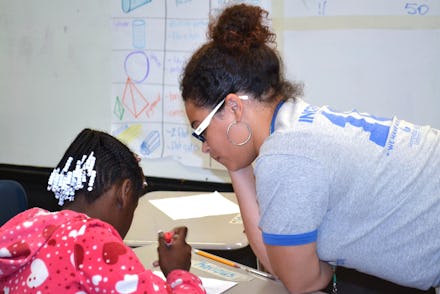So You Think You're "Post Race"

I was the white teaching assistant for a class called "Writing the Urban Experience" at a majority white college, in a majority white town, within a majority white state. Students of color from one of the school's scholarship programs were required to take the class, where they became unofficial authorities on the material, educating their small-town white peers. The male students of color in the class, who adopted a bemused but blasé attitude towards academia, would reveal their "hoodness" by sharing stories involving food stamps and gun fights, stories met with awe by the white audience.
In a recent story for the Atlantic, Aboubacar Ndiaye examines classroom situations like mine, pointing to a Northwestern study called "Diversify," which concludes that while adopting a "tough guy" attitude is helpful for black boys integrating into white suburban schools, the very same behavior is detrimental to their black female counterparts.
"Black boys embrace their masculinity by embracing the hood; black girls embrace their femininity by rejecting the hood," the professor teaching the class once told me. The study Ndiaye cites indicates that this is true, finding that "because of stereotypes about their supposed athleticism and 'coolness,' [minority boys] fit in better than minority girls."
Though black boys in the study faced the difficulty of performing a very narrow, minstrel-esque version of blackness, black girls were challenged with an even more complex performance, as they were implicitly required to navigate narrow gender and race roles. The loudness, toughness, and athleticism that allowed black boys to integrate more easily into a white student body had the opposite effect for black girls. When these girls behaved similarly, they were stereotyped as "loud" and "ghetto." Ndiaye writes that these girls "reported being seen by boys at their schools as 'aggressive' and not having the 'Barbie doll' look. The boys felt that dating the white girls was 'easier' because they 'can’t handle the black girls.'"
For young, white adults to proudly proclaim themselves to be "post-race" seems ludicrous given the pressure to conform to these racialized stereotypes. While my white students may have grown up far away from the "hood," they felt connected to it by watching the behavior of many of their black peers, and used their knowledge of their peers to confirm what they already thought about blackness.
White millennial culture behaves much like my white students did, accepting the narrow portrayal of bad-ass, street-wise young black men while rejecting black women who act similarly. The black boys in the Diversify study assumed a coolness learned from Kanye and an athleticism learned from LeBron because this is what their white audience expected. We consume Kanye and Lil Wayne, and hope our black male peers will adopt similar personae.
White millennials may consider ourselves "post-race" because we "understand" blackness in a way preceding generations did not, but only accepting gimmicky, gendered portrayals of blackness is hardly true understanding.